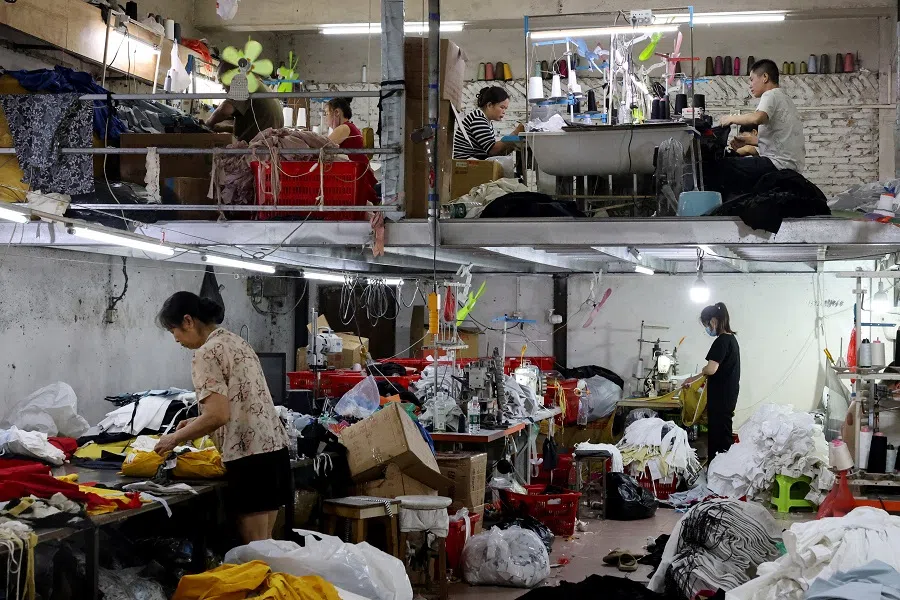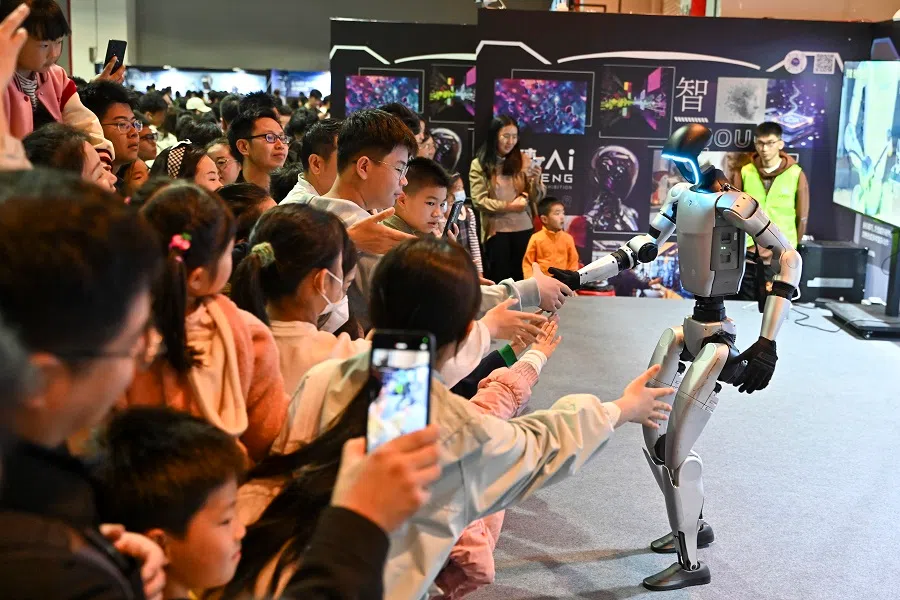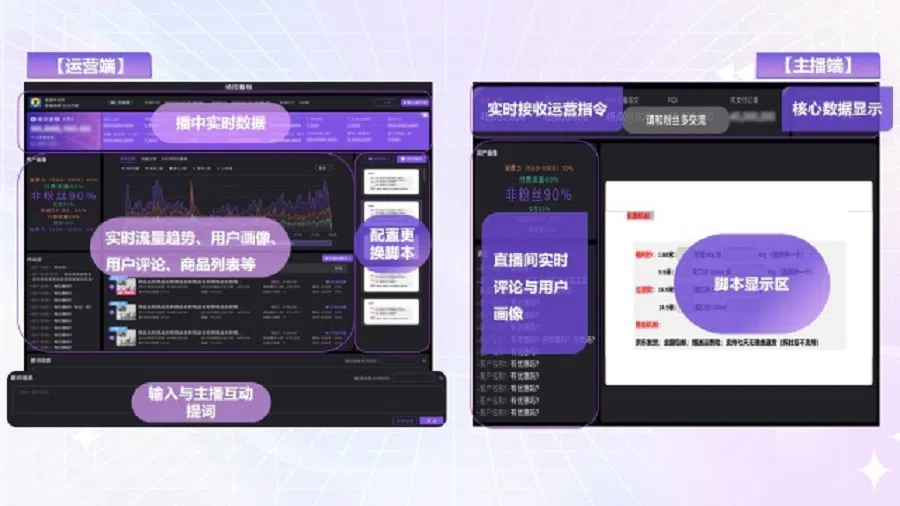[Big read] From manufacturing giant to AI leader: Can Guangzhou make the leap?

Guangzhou is setting its sights on becoming China’s next hub for applied AI innovation, says Lianhe Zaobao journalist Zeng Shi. However, competition is stiff, and some experts say that Guangzhou still has a long way to go before it can overtake cities like Shenzhen.
By leveraging AI tools, a car detailing shop in Guangzhou, China, generated over 100 personalised videos — each tailored to individual customers — in just 30 minutes, replacing traditional generic promo content. The results were immediate: scanning and sharing these tailored videos via QR codes drove a 50% week-over-week increase in new clientele.
Operating with just a three-person team, the shop now relies on AI to handle everything from content creation to social media scheduling. This technological shift has dramatically slashed both the time invested in digital marketing and customer acquisition costs, proving how small businesses can compete with larger players through smart automation.
... traditional production methods could not keep up with the demand for short videos in today’s commercial market. — Chen Long, product manager, Kuaizi Technology
Fulfilling the demand for short videos
Kuaizi Technology, a Guangzhou-based startup specialising in AIGC (Artificial Intelligence Generated Content) for commercial applications, is promoting intelligent content production and collaboration across industries to boost creative output and optimise operations. The car detailing shop example illustrates this approach, where Kuaizi’s AIGC platform provided tailored online marketing solutions.
Kuaizi Technology’s product manager, Chen Long, told Lianhe Zaobao that traditional production methods could not keep up with the demand for short videos in today’s commercial market. Kuaizi’s AIGC platform integrates the entire content creation process — scripting, shooting, editing, distribution and workflow management — to improve collaboration efficiency for businesses.

Founded in 2013, this tech company saw explosive growth after introducing its cloud-based business software platform in 2020. According to Chen, Kuaizi Technology has doubled its revenue every year for the past three years.
The company’s business users span sectors like online e-commerce, offline chains and lifestyle services, and include both industry-leading brands and downstream merchants such as agricultural products and tourist attractions, serving more than 7,900 businesses across 788 cities globally.
The company runs 200 smart livestreaming studios every day, working with more than 4,000 brands to generate about 5 billion RMB (US$697 million) in yearly online sales.
Large-scale, cost-effective live-commerce operations
Moli Group, also located in Guangzhou’s AI and Digital Economy Experimental Zone, specialises in AI-driven livestreaming commerce and integrated digital marketing solutions. The company runs 200 smart livestreaming studios every day, working with more than 4,000 brands to generate about 5 billion RMB (US$697 million) in yearly online sales.
Founder and CEO Lin Min explained their development of proprietary AI tools that enhance brand marketing across three key areas: social media campaigns, content management and livestream commerce operations. These solutions create a complete marketing cycle from social media to final sales.
Moli’s flagship livestream management system provides brands with comprehensive oversight of multi-platform operations, including account networks, personnel, content and budgeting. This AI-powered platform significantly reduces operational costs while improving efficiency.
A case in point: a leading global appliance manufacturer relies on the system to efficiently manage its 300 Douyin livestreaming channels — a scale that would be impractical without AI-driven management tools. The solution demonstrates how Moli’s technology enables brands to achieve large-scale, cost-effective live-commerce operations.
Developing an AI hub in Pazhou
Kuaizi Technology and Moli Group reflect the recent development trends from the experimental zone in Pazhou, Guangzhou. Established in 2020, Pazhou is a core area of the Guangzhou Artificial Intelligence and Digital Economy Experimental Zone.

Since 2021, Haizhu District, home to Pazhou, has been developing the “Pazhou Algorithm Valley” by promoting algorithms, computing power, and data, supported by incentive policies. To build influence in this field, the district has held the annual Pazhou Algorithm Competition since 2022, attracting algorithm teams from China and the world.
This roughly 15 square kilometre island in Guangzhou now hosts 120 industrial foundation model enterprises — companies specialising in large-scale AI foundation models tailored for industrial applications (manufacturing, energy, logistics, etc). Over half are developing viable business models and achieving profitability, creating a cluster of AI, e-commerce, big data and related digital economy businesses.
Public information indicates that Haizhu District currently has over 7,000 AI-related enterprises, with total revenue nearing 150 billion RMB in 2024.
Pazhou’s ‘Five Little Tigers’ for AI application
In fields such as general-purpose large language models and robotics, Hangzhou boasts the “Six Little Dragons”; in AI application fields, Pazhou has its own “Five Little Tigers”. These firms innovate in their respective vertical niche tracks, driving industrial intelligent transformation.
Cloud Butterfly Technology specialises in industry-specific large language models, leveraging big data and AI to drive digital transformation in education, healthcare, manufacturing and other traditional sectors.

Besides Kuaizi Technology and Moli Group, Pazhou hosts the R&D team for Quark — Alibaba’s flagship AI application. Originally launched in 2016 as an intelligent search tool, Quark received a major upgrade in March 2025, transforming into a comprehensive “AI super framework” capable of AI-powered search, content creation and image generation. The platform has demonstrated remarkable growth, reaching nearly 150 million monthly active users by March 2025.
The “Five Little Tigers of Pazhou” tech cluster is completed by two additional innovators: Zhijing Technology provides full-spectrum digital solutions for Guangzhou’s traditional textile industry, enabling supply chain coordination and precision matching across the entire production cycle. Cloud Butterfly Technology specialises in industry-specific large language models, leveraging big data and AI to drive digital transformation in education, healthcare, manufacturing and other traditional sectors.
This concentration of AI talent and innovation in Pazhou’s experimental zone showcases Guangzhou’s growing prominence as a centre for practical AI applications that bridge digital and traditional industries.
“These established industries create numerous practical applications and commercialisation opportunities for AI technologies.” — Peng Peng, director, Guangzhou PhDs’ Research Association for Scientific and Technical Innovation
Peng Peng, director of the Guangzhou PhDs’ Research Association for Scientific and Technical Innovation, emphasised in an interview that the Guangdong Artificial Intelligence and Digital Economy Laboratory in Pazhou has developed a robust industrial ecosystem after years of growth.
“Guangzhou possesses unique strengths for AI development,” Peng noted. “The city benefits from a diverse industrial base, including thriving live streaming and e-commerce sectors, along with a concentrated gaming industry cluster. These established industries create numerous practical applications and commercialisation opportunities for AI technologies.”
Lack of globally competitive AI champions in Guangzhou
As artificial intelligence emerges as the defining battleground of technological supremacy, China’s major cities are carving out distinct roles in the national push for dominance. Each hub brings unique advantages to this high-stakes race, yet all face critical challenges that could determine their future standing in the global AI hierarchy.

Beijing stands as the undisputed leader in foundational research, serving as the nation’s intellectual engine for breakthrough innovations. Shanghai leverages its financial sophistication and international connectivity to assemble a comprehensive AI ecosystem, while Hangzhou’s early bets on commercialisation have given rise to its formidable “Six Little Dragons” cluster.
Guangzhou’s AI landscape remains overwhelmingly focused on downstream applications, with a staggering 80% of its enterprises operating in this segment while core technology developers remain scarce.
In the Greater Bay Area, Guangzhou and Shenzhen embody contrasting approaches — the former thriving in AI applications through its diverse industrial base and academic resources, the latter excelling in hardware integration thanks to its unparalleled innovation culture.
Yet these strengths come with significant limitations. Guangzhou’s AI landscape remains overwhelmingly focused on downstream applications, with a staggering 80% of its enterprises operating in this segment while core technology developers remain scarce. Shenzhen’s hardware prowess, meanwhile, is constrained by relatively weak academic research capabilities and an underdeveloped system for collaborative industrial innovation.
As Peng observes, perhaps the most pressing challenge for Guangzhou lies in its lack of globally competitive AI champions — a deficiency that underscores the gap between regional specialisation and true leadership.
The path forward will require more than government support and isolated successes. For China’s AI hubs to transition from regional strengths to global competitiveness, they must develop complete value chains capable of both foundational breakthroughs and large-scale commercialisation. The coming decade will test whether these cities can transform their specialised advantages into comprehensive ecosystems that redefine China’s position in the global AI order.
Guangdong needs to strengthen basic research to catch up
At the official level, Guangdong province has ramped up its efforts in AI this year. In March, it issued policy measures to promote innovation in Guangdong’s AI and robotics industries, with more support in areas such as funding, talent and land use. The local government hopes that these measures will transform Guangdong into a global innovation hub for the AI and robotics industries.
Peng said Guangdong has a strong foundation in manufacturing and should fully leverage its advantage as a manufacturing powerhouse by actively developing diverse application scenarios. This will enable the deep and comprehensive integration of AI with its well-established industrial system, and help Guangdong become a major province for AI applications.

Guo Wanda, executive vice-president of China Development Institute (CDI), told Lianhe Zaobao that global competition in artificial intelligence is becoming increasingly intense, with rapidly evolving technologies and a high degree of uncertainty. Breakthroughs may emerge from innovative startups, and newcomers may catch up or even surpass current leaders.
He felt that strengthening basic research is a key focus for Guangdong if it wants to elevate its AI industry to a higher level. While promoting the adoption of new technologies across more sectors, efforts should also be made to support startups, attract talent and industries, and foster an environment that encourages technological R&D, to spark disruptive innovation.
... there were 918 AI companies in China as of October 2024, while 203 (over 22%) had initiated the process of going global.
Chinese AI companies expand overseas
Amid the global wave of digitalisation and intelligent transformation, Chinese AI companies are turning their attention to international markets. Drawing on their technological strengths and innovation capabilities, they are venturing abroad and starting to establish a presence on the global stage.
According to a report on the overseas growth of China’s AI, released in May by the Economic View Research Institute and the National Institute of Advertising, there were 918 AI companies in China as of October 2024, while 203 (over 22%) had initiated the process of going global.
The report noted that among these Chinese AI companies expanding abroad, the vast majority (up to 76%) focus on products in the application layer. In 2025, the overseas deployment of AI applications has grown rapidly in terms of both quantity and variety.
Southeast Asia an important destination
Many Chinese companies have chosen Southeast Asia as a key destination for their overseas expansion. Moli Group’s Lin Min said content-based e-commerce in Southeast Asia has developed rapidly in recent years, with platforms such as TikTok, Shopee, Lazada and Temu seeing explosive growth. Chinese companies are showing strong enthusiasm for expanding abroad, with smart technology products leading the charge into Southeast Asian markets.
Moli Group also serves brands expanding into Southeast Asia. According to Lin Min, Moli Group hopes to create a new paradigm for overseas channels and models in the coming years, helping more Chinese brands venture abroad while also assisting high-quality international brands to enter the Chinese market.

Guo Wanda observed that China’s early and rapid development in AI, coupled with technological upgrades such as large language models, has driven widespread application. Emerging markets like Southeast Asia and the five Central Asian countries have urgent needs for digital and intelligent transformation, offering opportunities for cross-border development.
He said major Chinese firms such as Huawei, Tencent and Alibaba have already deployed businesses that combine AI manufacturing and internet big data globally. AI application companies are also drawing on their experience in the Chinese market to expand into Southeast Asia and even to the global market. This is a natural choice for enhancing international competitiveness and growing market presence.
However, Guo also pointed out that the overseas expansion of Chinese AI companies faces many complex factors and uncertainties, including geopolitical risks, cultural differences and legal barriers. In addition, global regulations on AI technologies and data usage are becoming increasingly stringent. Issues such as compliance, technical adaptation, and policy coordination are all critical considerations for companies seeking to expand globally.
This article was first published in Lianhe Zaobao as “中国AI产业火爆赛道挤 广州新应用要弯道超车”.





